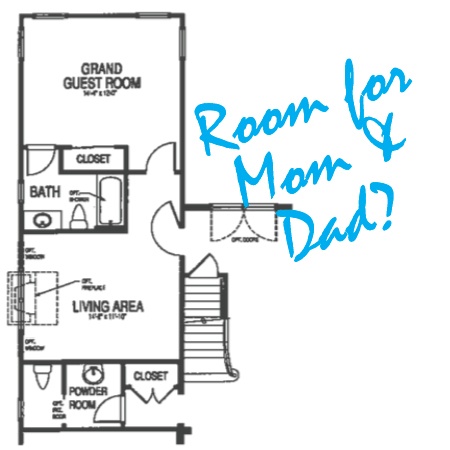Not so long ago, multi-generational homes were the norm in the U.S. Senior citizens lived with their sons and daughters, and young people remained in the family home years after they graduated from high school and college. As the decades passed, both generations began living on their own instead of cohabitating with family. Today, things are changing again. In fact, many people in the Central New Jersey area are realizing that a multi-generational home can be an excellent option.
A Large Home Makes Aging in Place Easier
Getting older wouldn’t be so bad if it just involved a few more wrinkles and gray hairs. Unfortunately, the passing years can bring unwelcome health changes that may make it difficult to live alone. Although you might never need help, it makes sense to plan for the possibility now.
Are you considering buying a new home? Why not choose one that has a few extra bedrooms? Should you ever need a little assistance from family members, you’ll have plenty of room to accommodate them.
Buying a larger home may also make financial sense. If you look at long-term costs, it will probably be cheaper to purchase a spacious home rather than pay for a costly addition to house family members or caregivers years from now.
Childcare Becomes Less of a Concern When Multiple Generations Live Together
Quality childcare doesn’t come cheap. New Jersey residents can expect to pay more than $15,000 per year for infant childcare in an accredited childcare center, $5,676 for before/after school care and $2,564 for a full-time summer program for school-age kids, according to Child Care Aware of America.
When multiple generations share a home, it’s much easier to create a childcare plan that doesn’t cost thousands of dollars or involve waking your kids at 6:00 a.m. to make the trip to daycare every day. Whether your parents offer to care for your children while you’re at work, or your college-age nephew is willing to provide after-school care, it’s much more convenient when everyone lives together.
Multi-Generational Homes Allow Young People to Ease into the World
Do you remember how exciting it was to receive your first real paycheck? Although those numbers printed on your check may have seemed impressive initially, there probably wasn’t much left over after you paid your rent and utilities and bought a few groceries.
Things aren’t any easier for today’s youth. Some of them are burdened by student loans, while others can’t afford the high rents charged in New York City, where a walk-up studio can cost $2,500 or more. Prices aren’t much better in the New Jersey counties surrounding the city.
Living at home gives your kids the opportunity to save most of their paychecks rather than spending them on exorbitant rents and a month-long supply of ramen noodles. In a few years when their salaries increase, your children will have enough saved to put a deposit on an apartment or even buy a small condo or home. While they’re living with you, they can help care for younger siblings or grandparents or housesit when the rest of the family goes out of town.
Living Together Offers Health and Social Benefits
Older people often report feeling isolated and lonely, particularly if they can no longer drive. Isolation and loneliness can be just as detrimental to your health as smoking. In fact, lonely people have a 26 percent higher chance of dying than those who live with other people.
It’s not unusual for older people to try to hide their ailments because they don’t want to be a burden on their children. Unfortunately, pretending that everything is fine may mean senior citizens don’t receive the medical treatment they need. When everyone lives together, it’s much easier to spot changes in physical and emotional health.
Isolation isn’t just an issue for senior citizens but can affect your health at any age. Humans thrive on social interactions. Although your family may test your patience at times when you all live together, the benefits of group living can’t be denied.
Living with people of all ages can also improve your children’s ability to interact with people of all ages. Kindness and compassion often come naturally to children who have enjoyed a nurturing relationship with older relatives, and in turn, helped those relatives when needed.
Big Family Homes Offer Flexibility
Larger homes offer plenty of possibilities. Although you may not need every inch of the space right now, you never know when your circumstances may change. If you plan to age in place, your first-floor guest suite can easily become your master bedroom suite should you ever face mobility issues. An extra room can serve as a home gym or craft room now but be pressed into service as a bedroom if your son and his family need a place to stay while they’re building a new home.
Big homes offer equally large basements. Whether you finish the basement before you move into your new home or tackle the job in a few years, full basements offer plenty of room to add second family rooms, in-law suites, or play or game rooms.
Tips for Living with Multiple Generations
It definitely takes a little while to adjust to living with multiple generations of your family if you’re used to living alone or with just one or two other people. These tips can make the adjustment process easier:
- Provide Separate Spaces: No matter how much you love your family, you probably don’t want to spend every waking hour with them. Luckily, large homes feature plenty of separate spaces. Bedrooms with ensuite bathrooms prevent squabbles about bathroom schedules or cleanliness. Turning your basement into a second living space offers privacy and independence for grandparents or young people living at home to save money.
- Make Financial Expectations Clear: Avoid arguments by clearly defining financial expectations before everyone moves in together. Will family members pay part of the mortgage, utility bills and food costs? What about extras, like Netflix or cellphone plans?
- Develop a Chore Schedule: Resentment can quickly build if you feel that you’re the only one emptying the dishwasher or cleaning the powder room. A schedule will ensure that everyone plays a role (whether large or small) in keeping your home running efficiently.
- Talk About Communal Living Issues: How will you handle noise, overnight guests, food shopping, child care, pet care and other issues?
Is your home too small for the whole family? Country Classics could have the perfect home option for you! Feel free to explore our website to learn more about our current home offerings.
Sources:
Perspectives on Psychological Sciences: Loneliness and Social Isolation Are Risk Factors for Mortality
https://journals.sagepub.com/doi/abs/10.1177/1745691614568352?journalCode=ppsa
Child Care Aware of America: 2018 State Child Care Facts in the State of New Jersey














Leave a Comment